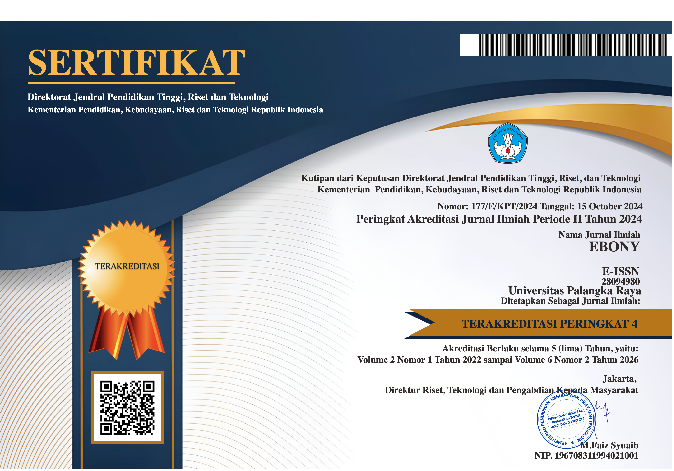Mispronunciation of English Fricative Consonant Sounds by East Nusa Tenggara Students
DOI:
https://doi.org/10.37304/ebony.v5i1.17632Keywords:
mispronunciation, fricative consonants, interlingual interferenceAbstract
This study aims to examine the incorrect pronunciation of specific English fricative consonants (/v/, /θ/, /ð/, /ʃ/, /ʒ/) by Indonesian students, particularly those from East Nusa Tenggara who are studying English as a foreign language. Five male university students from East Nusa Tenggara province, who were brothers of the Society of the Divine Word and had attended an English course, were selected to study pronunciation of fricative consonants. The researchers conducted ten-word list, recorded the data, and analyzed the mistakes using the International Phonetic Alphabet (IPA). A native speaker assessed using a scoring rubric from 1-5. The pronunciation was correct if the scores were 4 and 5, while scores 1-3 were incorrect. The findings were then presented in the research. Results indicated typical substitutions of v/ with /f/, /θ/ with /t/, /ð/ with /d/, /ʃ/ with /s/, and /ʒ/ with /s. The study reveals that students in East Nusa Tenggara enhance their pronunciation and confidence by employing contextualized materials, foreign speakers, pronunciation software, audiovisual techniques, and community-based English activities.
Downloads
References
Ammar, M. D., Rudi, H., & Angraini, N. (2022). English Pronunciation Problems Analysis Faced By English Education Students in the Second Semester At Indo Global Mandiri University. Global Expert: Jurnal Bahasa dan Sastra, 10(1), 1–7. https://doi.org/10.36982/jge.v10i1.2166
Antaris, I., & Omolu, F. A. (2019). Factors Affecting Pronunciation difficulties of 8th grade students of MTSN Palu Barat. Journal of Foreign Language and Educational Research, 2(2), 10–19. https://doi.org/10.31934/jofler.v2i2.1349
Astuty, A. D. (2022). Phonological Interferences in the English of Buginese Students. International Journal of Research on English Teaching and Applied Linguistics, 3(1), 53–61. https://doi.org/10.30863/ijretal.v3i1.3152
Brown, D. H. (2007). Principles of Language Learning and Teaching. In Pearson Education (5th ed.). https://doi.org/10.1017/cbo9781139062398.015
Burquest, D. A. (2006). Phonological analysis: A functional approach (3rd ed.) (3rd ed.). SIL International.
Desi, A., Badawi, & Setiani, R. (2022). The Correlation Between Students’ Pronunciation and Their Speaking Ability of The Eight Grade in SMPN 07 Kotabumi Academic Year 2021/2022. Jurnal Griya Cendikia, 7(2), 235–244.
Eka, E. I., Nasa, R., & Yanto, Y. (2023). Contrastive Analysis Between Lio Language And English (A Phonological View). Fonologi : Jurnal Ilmuan Bahasa dan Sastra Inggris, 1(4), 01–19. https://doi.org/10.61132/fonologi.v1i4.44
Eldika, T., & Zainil, Y. (2022). An Analysis of Students’ Error in Pronouncing Dental Fricative Consonant [/ð/,/θ/]. Journal of English Language Teaching, 11(4), 621–628. https://doi.org/10.24036/jelt.v11i4.119788
Faturrachman, Y., & Ulva, S. M. (2021). The Error Pronunciation of Learners in Learning English for Specific Purposes (ESP) in New Trend (You Tube) Application. English Education:Journal of English Teaching and Research, 6(1), 66–74. https://doi.org/10.29407/jetar.v6i1.14842
Fauzi, I. (2021). The Variability in Phonology of Indonesian Learner’s Interlanguage: A case study on English marked-fricatives. International Journal of Language Education, 5(4), 285–295. https://doi.org/10.26858/ijole.v5i4.19468
Fromkin, V, Rodman, R, Hyams, N. (2011). An introduction to Language. In Wadsworth Cengage Learning. (9th ed., Vol. 1, Nomor 1). Wadsworth Cengage Learning. https://doi.org/10.3406/rfea.1996.1625
Gharawah, F. M. A., Putro, N. H. P. S., Pohan, A. E., & Alsamiri, Y. A. (2024). Improving English Pronunciation Through Phonetics Instruction in Yemeni EFL Classrooms. Journal of Languages and Language Teaching, 12(2), 930. https://doi.org/10.33394/jollt.v12i2.10720
Gulo, T. (2023). Identifying Students’ Difficulties In Pronouncing English Vocabulary at the Tenth Grade of SMTK Mo’ale. Research on English Language Education, 5(1), 52–64. https://jurnal.uniraya.ac.id/index.php/Relation/article/view/876/817
Gustina, I., Suwarni, A., & Sartika, D. (2023). English Fricatives Sound Pronounced by The Students’. ELS Journal on Interdisciplinary Studies in Humanities, 6(1), 2023. https://doi.org/10.34050/elsjish.v6i1.25688
Kamhar, M. Y. (2021). Pembelajaran Fonetik Bahasa Indonesia Pada Mahasiswa Asal Nusa Tenggara Timur Di Unitri Malang. Jurnal Bindo Sastra, 5(2), 65–73. https://jurnal.um-palembang.ac.id/bisastra/article/download/3677/2825keslahan
O’Connor, J. D., & Trim, J. L. M. (1953). Vowel, Consonant, and Syllable—A Phonological Definition. WORD, 9(2), 103–122. https://doi.org/10.1080/00437956.1953.11659461
Odden, D. (2013). Introducing Phonology (2nd ed.). Cambridge University Press.
Richard, J. (1971). A Non-Contrastive Approach to Error Analysis. ELT Journal, XXV (204–219).
Situmeang, I. T., & Lubis, R. F. (2020). Students ’ difficulties in pronouncing fricative consonant. English Education; English Journal for Teaching and Learning, 08(01), 38–46. http://jurnal.iainpadangsidimpuan.ac.id/index.php/EEJ
Sudarmaji, I., & Yusuf, D. (2021). The Effect of Minecraft Video Game on Students’ English Vocabulary Mastery. JETAL: Journal of English Teaching & Applied Linguistic, 3(1), 30–38. https://doi.org/10.36655/jetal.v3i1.600
Suhil, M., & Romadoni, M. R. (2024). Analysis of Efl Student Pronunciation Errors : A Case Study of Two Adolescent Students. Ethical Lingua, 11(2), 303–315. https://doi.org/10.30605/25409190.703
Syafrizal, S., Wahyuni, S., & Syamsun, T. R. (2022). Pronunciation Errors of the Silent Consonants of Junior High School Students. ELTICS (English Language Teaching and English Linguistics) Journal, 7(2), 155–165. https://doi.org/10.31316/eltics.v7i2.3251
Wiratsih, W. (2019). Analisis Kesulitan Pelafalan Konsonan Bahasa Indonesia (Studi Kasus terhadap Pemelajar BIPA Asal Tiongkok di Universitas Atma Jaya Yogyakarta). KREDO : Jurnal Ilmiah Bahasa dan Sastra, 2(2), 242–255. https://doi.org/10.24176/kredo.v2i2.3061
Yuliansih, D., Qonaatun, A., & Oktaviana, F. (2022). An Analysis of Students Difficulties in Pronouncing English Vowels in Their Speaking Skills Based On Mother Tongue. English Education, Linguistics and Literature Journal, 1(1), 29–36. https://jurnal.uinbanten.ac.id/index.php/ell/article/view/5659
Downloads
Published
How to Cite
Issue
Section
License
Copyright (c) 2025 Marianus Paulino Mada

This work is licensed under a Creative Commons Attribution 4.0 International License.











